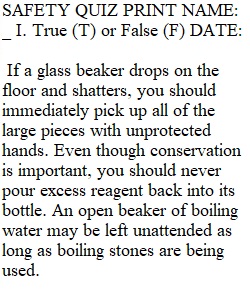


Q SAFETY QUIZ PRINT NAME: _ I. True (T) or False (F) DATE: If a glass beaker drops on the floor and shatters, you should immediately pick up all of the large pieces with unprotected hands. Even though conservation is important, you should never pour excess reagent back into its bottle. An open beaker of boiling water may be left unattended as long as boiling stones are being used. Pipetting straight out of a reagent bottle is an acceptable lab technique. When pouring a liquid into a graduated cylinder in the hood, the safest place for the graduated cylinder is on the front edge. Weighing paper full of excess chemicals should be left by the balances. When using a Bunsen burner, it is an acceptable lab technique to leave the gas on while searching for a match. A reagent bottle must never be taken to your workbench. It is not necessary to consult the instructor before disposing chemicals down the sink. Since appearance is important, you should always wear your best outfits to lab. You should never look directly down into a container being heated because some of the material may splatter onto your face and clothing. Baking soda can be used to neutralize bases. If a small piece of matter is lodged in the tip of a pipet, buret, or eye dropper, it is acceptable to blow the piece out with your mouth. If a solution needs to be swirled, it is better to use an open-mouth beaker than a narrow-mouth Erlenmeyer flask. If a chemical smells good, it must taste good and therefore it can be eaten. It is not necessary to stir when two liquids are being mixed to form a solution. You should never add a lot of acid to a small amount of water. Smoking is allowed in the laboratory but only in a special area since matches and Bunsen burners are also used in that area. You may do any experiment you wish in the laboratory. In case of a fire, accident burn, or other emergency, notify the instructor at once after the appropriate action has been taken. If you endanger your life or the lives of others in the lab you may be subjected to disciplinary action and suspended from the course. Long hair should be confined to keep it out of flames and chemicals. Reactions that give off poisonous gases should be done in the hood. Eye protection is not needed while you are reading or writing in the lab even if other students are still performing their experiments. It is appropriate to return unused chemicals to its original container in order to avoid wasting materials. When taking chemicals from a stoppered bottle always lay the stopper on a clean and covered counter top before pouring. It is an acceptable lab technique to weigh glassware immediately after heating. Volumetric glassware such as graduated cylinders may be heated to dry them. If your clothing catches fire one option is to immediately use the safety shower. Bare feet and open toed sandals are permitted in the lab. Never place your nose directly at the opening of a reagent bottle to smell it. The very last thing you should always do before leaving lab is to wash your hands. A thermometer may be used as a stirring rod if a glass rod cannot be found. Although food is not allowed in the lab, covered drinks are. If a chemical gets into your eyes, you should immediately go to the eyewash sink located on the sides of the room and flush both eyes for at least 15 minutes. I have been informed and I will comply with the safety rules and regulations described in this quiz, the laboratory manual, and the safety video. Sign your name:
View Related Questions